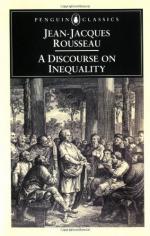
|
| Name: _________________________ | Period: ___________________ |
This quiz consists of 5 multiple choice and 5 short answer questions through Chapter 6, A Discourse on the Origin of Inequality, Appendix.
Multiple Choice Questions
1. What should society teach men to do instead of pursuing virtue, according to Rousseau?
(a) To be humble.
(b) To love.
(c) Their duty.
(d) Their role.
2. Where does Rousseau question language evolved from?
(a) Between the parent and child.
(b) In the savage and animal.
(c) In religious mediations.
(d) Through prayer.
3. What does Rousseau say arts require?
(a) Power.
(b) Passion.
(c) Talent.
(d) Luxury.
4. What has added little to happiness in humans, according to Rousseau?
(a) Government contol.
(b) The progress of art.
(c) Wars.
(d) The progress of arts and sciences.
5. According to Rousseau, what is the natural or physical inequality established by?
(a) Nature.
(b) Society.
(c) Weather.
(d) Government.
Short Answer Questions
1. What cannot be uncovered about nature's inequality, according to Rousseau?
2. What do people seek that do not exist, according to Rousseau at the end of Chapter 2, "A Discourse on the Moral Effects of the Arts and Sciences, Part II"?
3. How does Rousseau think the gods will react to people forming a more perfect union?
4. According to Rousseau, what do men have that is difficult to control?
5. What do few artists defend according to Rousseau in "Chapter 2, A Discourse on the Moral Effects of the Arts and Sciences, Part II"?
|
This section contains 225 words (approx. 1 page at 300 words per page) |

|




